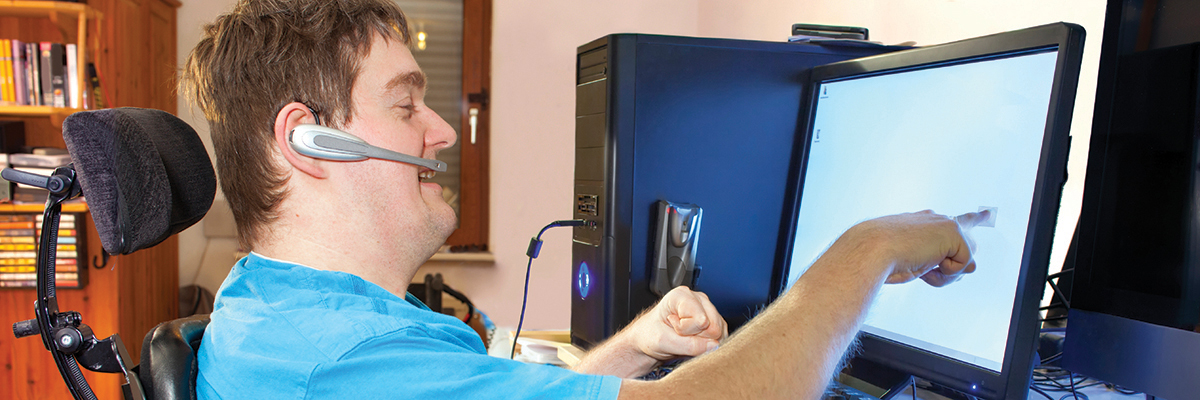
Transition Information for Minnesota Parents
The road to adulthood for youth with disabilities is filled with opportunity, and parents play a key role. Your teen can play an active role in the transition journey, and in determining their own life, if you provide encouragement and guidance along the way.
IMPORTANT SPECIAL EDUCATION UPDATE FOR MINNESOTA FAMILIES: Transition Age Extended to Age 22
Legislation was recently enacted, and a court case was recently decided, both of which provide that students with disabilities are eligible for transition services until they turn 22. If your child is still in school, please contact your school district to request that they continue transition services until they turn 22. If your child turned 21 on or after July 1, 2019, and their special education services ended before July 1, 2023, they are likely eligible for compensatory services for services not received before their 22nd birthday. In order to access those services, please contact your school district or transition program to re-enroll your child or discuss compensatory services.
If the school refuses your request to re-enroll your student or refuses your request for transition services, please contact the Minnesota Disability Law Center at 1-800-292-4150.
For other questions related to transition programming or services, please contact PACER Center at [email protected] or 952-838-9000.
Inspiring Possibilities: Living, Learning and Working After High School — Transition Mini-Conference for Minnesota Parents
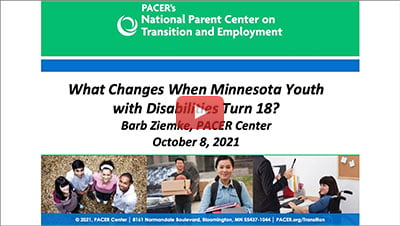
Session 1: What Happens When Minnesota Youth with Disabilities Turn 18?
This fast-paced session covers the essentials of what families need to know and do before their teen turns 18 and/or receives their diploma or ages out of public education.
Presenter: Barb Ziemke, PACER parent advocate and co-director of PACER’s National Parent Center on Transition and Employment
Related Materials
- Slide Deck of Presentation
- Prepare Your Child for the Age of Majority and the Transfer of Rights in Minnesota
- Minnesota Secondary Transition Toolkit for Families: A Guide for Preparing Your Child with a Disability for Life Beyond High School
- Mapping Dreams: The Transition to Adulthood
- Ten Tips That May Help Your Child’s Transition to Adulthood
- The Supplemental Security Income (SSI) Application Process
- Help Your Young Adult Learn About Accessing Accommodations After High School
- Resource List of Minnesota Disability Organizations
- Resources to Help Plan for Your Child’s Future
- Website: National Parent Center on Transition and Employment (Learning Centers by Topic)
- Website: Students and Young Adults
- Website: Health Information Center
- Website: Simon Technology Center
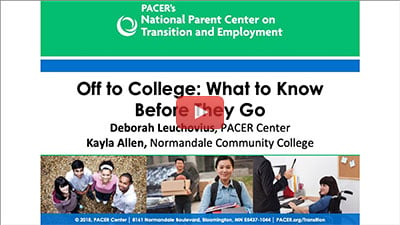
Session 2: Off to College: What You Need to Know Before They Go
Families of youth with disabilities who will attend 2-or 4-year college programs provides essential information about changing rights, roles, and responsibilities, along with practical tips for student success.
- Key laws to know and understand
- The role of parents and students
- Disability disclosure
- The ins and outs of accessing accommodations in college
Presenter: Kayla Allen, Accessibility Specialist from the Office for Students with Disabilities (OSD) at Normandale Community College
Related Materials
- Slide Deck of Presentation
- Understanding the Difference Between High School & College
- Primer on the Normandale Community College Office for Students with Disabilities
- A High School Parent's Guide to College
- Accommodations, Rights & Responsibilities of Students with Disabilities
- Self Advocacy: Steps you can take to help you be a successful student
- Website: The 411 on Disability Disclosure: A Workbook for Youth with Disabilities
- The ADA, Section 504 & Postsecondary Education
- Communicating with Your Student's College under FERPA
- Parenting Postsecondary Students with Disabilities
- Website: Students with Disabilities Preparing for Postsecondary Education: Know Your Rights and Responsibilities
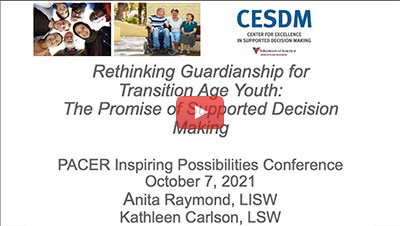
Session 3: Rethinking Guardianship for Transition Age Youth: The Promise of Supported Decision Making
Commonly, parents of children with developmental disabilities are encouraged to seek guardianship when their child is approaching age 18. But that may be an overly restrictive intervention. Learn how Supported Decision Making, a nationally recognized option, can maximize self-determination while acknowledging concerns related to vulnerability for people with disabilities.
Presenters: Anita Raymond, Program Director and Kathleen Carlson, Lead Social Worker, Volunteers of America-Minnesota’s Center for Excellence in Supported Decision Making
Related Materials
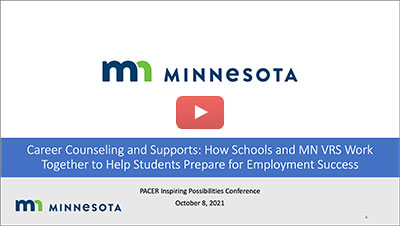
Session 4: Career Counseling and Supports: How Schools and MN Vocational Rehabilitation Services (VRS) Work Together to Help Students Prepare for Employment Success
The Individuals with Disabilities Education Act (IDEA) and the Workforce Innovation and Opportunity Act (WIOA) now require high schools and VRS to plan and coordinate career supports and services for high school students with disabilities. Learn how VRS Student Career Services can help your student discover:
- Their strengths and interests
- Career and postsecondary education possibilities
- How to gain work skills and experiences
- What they’ll need to make their plan happen!
Presenters: Alyssa Klein, Transition and Pre-Employment Transition Services Coordinator,
Minnesota Department of Employment and Economic Development (DEED)- Vocational Rehabilitation Services (VRS) and Lindsey Horowitz, Post-Secondary Transition Specialist, Minnesota Department of Education (MDE)
Related Materials
What’s Your Next Step?
- Next Step Action Plan
The Next Steps Action Plan is a notetaking and follow-up tool for participants/viewers to use for each of the conference sessions. It is explained in the first session.
This event was made possible with funding from the Richard M. Schulze Family Foundation
